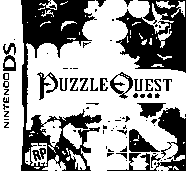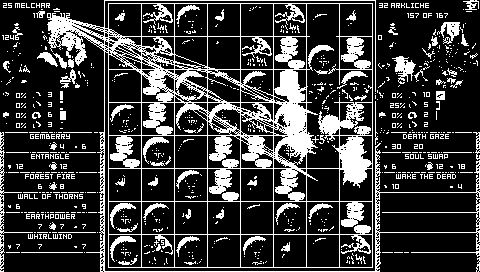 a review of Puzzle Quest
a review of Puzzle Quest
a videogame developed by 1st playable productions
and published by d3 publisher
for the nintendo DS
text by Alex Felix
I have played Bejeweled maybe twice, ever, in my history as somebody who plays videogames. I would have played it more than just the two times, except it didn’t really hold my attention, insofar as I’m not the kind of person who needs colored gems or whatever else to fiddle around with while I’m doing other very important things with a computer. It demands too much of my attention; it asks too little. To this end, certainly, I am not a “casual gamer.†I very well may be the opposite of that, although I’d have no way of knowing, because any and all monikers thus far ascribed to people who occupy such a status are horrifically embarrassing and you can’t very well be “hardcore†on your own terms, now, can you?
“Videogames are serious business,†is how the joke goes, I believe.
Puzzle Quest – a game which received no press whatsoever up until the day of its release presumably due to nobody caring and/or its having a development time of about three months – “is like Bejeweled, only as an RPG.†Any major gaming news outlet will tell you this in approximately six seconds, and then you’re in luck, because there is nothing else to be said about Puzzle Quest.
And yet this game is scoring eights and nines all over the place.
Puzzle Quest, you see, lets you level up. Funnily enough, the actual up-leveling here is probably the least interesting since Final Fantasy IV, wherein the player was told “Cecil gained a level!†and was then supplied with a bunch of numbers to evidence this; you weren’t really meant to pay attention to these numbers beyond the fact that they were going up, mind you – that’s an innovation we’re blessed with only in modern times. In Puzzle Quest, by comparison, you’re asked to personally select which numbers you’d like to go up, and then, in an act of appalling mockery, the game helpfully shows you the tiny, tiny fractions by which this will cause the other, actually “important†numbers to increase in kind.
(An example: say you choose to invest one point in “Fire Mastery†rather than “Air Mastery†or “Cunning†– this will in turn boost your “Fire Resistance†by a quarter of a percent, and give you an additional two percent chance of getting a free turn when you match “Fire Gems.†Numbers go up, but only barely.)
Yet I cannot stop playing Puzzle Quest. It is, objectively, a pretty good videogame. It takes an apathetic but not awful role-playing game framework and gives you Bejeweled in lieu of random battles. Bejeweled, for those not in the know, is a more or less traditional “puzzle†game whose gameplay centers around matching similar gems out of seven or eight distinct types in a crossword-puzzle grid. In Puzzle Quest, certain gems boost corresponding mana stockpiles, and other gems damage your opponent, and if you have enough of a given type of mana (blue, red, yellow, or green), you can choose to forego the gem-matching process entirely for one turn and cast a spell, instead.
It turned out better than it had to. Taking into account that the puzzle pieces fall Connect-Four style when those below them are matched and therefore removed from play, and the fact that your opponent gets a crack at the board for each time you do, you end up having to think pretty far in advance. I get the feeling that the developers had no idea just how workable of a game they were making, at times: it happens occasionally that there’s only one move you could make on your turn, and that’s going to set the evil Skeleton guy up for something huge on his turn, but – wait! You’ve got enough mana to cast the “Cure Poison†spell, and even though nobody’s poisoned, that’ll save you from having to make a move at all, and – when it works, it works.
 The depressing thing about all of this, as should be abundantly clear by now, is that the game had to give me incentive to play it. I’ve resigned myself to the fact that I’m not the sort of guy who carries around Bejeweled in his DS (“Zoo Keeper,†actually, is the name of the DS iteration, for who knows what reason, although damned if it doesn’t have little animal faces in lieu of colored gems). I play and enjoy Puzzle Quest instead because it gives me that wonderful false sense of accomplishment when I make progress in the game and purchase new weapons with fake money that will be waiting for me the next time I turn the game on. I earned that fake money by doing the exact same thing during the first ten minutes I spent playing Puzzle Quest as I will do during the last ten minutes I spend playing Puzzle Quest. It is a gloriously transparent RPG, replete with a storyline that goes on too long and isn’t interesting to anybody.
The depressing thing about all of this, as should be abundantly clear by now, is that the game had to give me incentive to play it. I’ve resigned myself to the fact that I’m not the sort of guy who carries around Bejeweled in his DS (“Zoo Keeper,†actually, is the name of the DS iteration, for who knows what reason, although damned if it doesn’t have little animal faces in lieu of colored gems). I play and enjoy Puzzle Quest instead because it gives me that wonderful false sense of accomplishment when I make progress in the game and purchase new weapons with fake money that will be waiting for me the next time I turn the game on. I earned that fake money by doing the exact same thing during the first ten minutes I spent playing Puzzle Quest as I will do during the last ten minutes I spend playing Puzzle Quest. It is a gloriously transparent RPG, replete with a storyline that goes on too long and isn’t interesting to anybody.
(To be fair: when you get into a random battle with a monster whom you have already fought a certain number of times, you are given the option to “capture†it instead, which results in a sort of brain teaser-type puzzle rather than the ordinary “battle†setup, and these are more often than not a treat – “Look!” it begs you; designed rather than generated content; Eastern rather than Western game design – what are the implications?! The implications, apparently, are that your character ends up riding the rat you “captured” – because they do that in Warcraft, and rest assured that’d be mortifying enough if not for the stat boost)
Puzzle Quest should be tethered to the wall over your toilet. As a DS game, it will no doubt keep your brain sharp, and that’s hardly an aspect of your life where you want spontaneity, besides.
–Alex Felix
6 Responses to Puzzle Quest